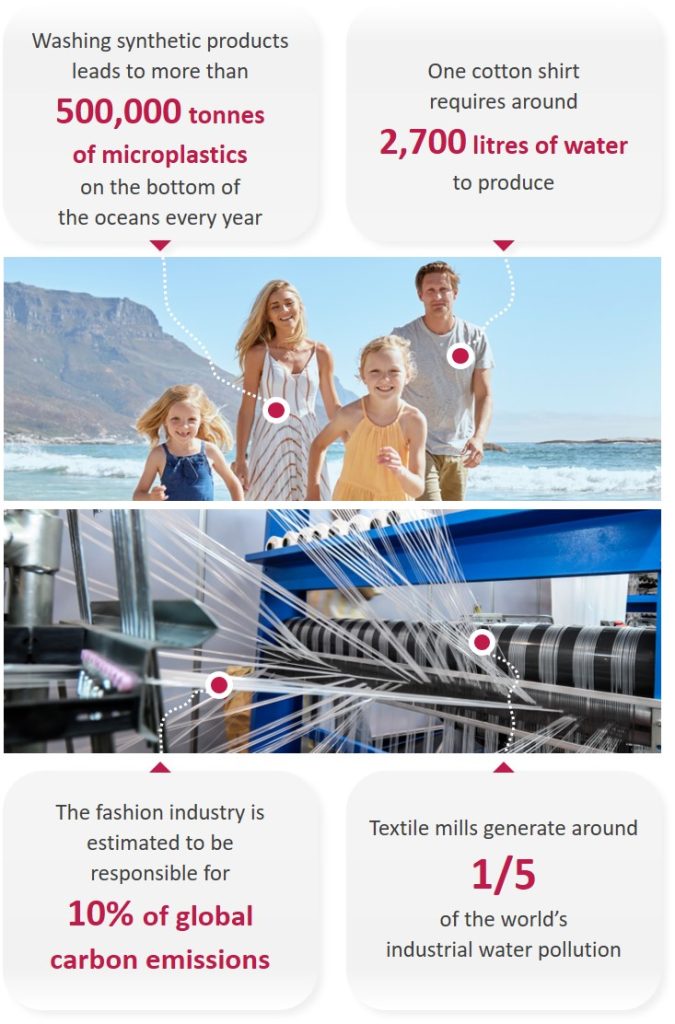Despite increased awareness about sustainability, the fashion industry’s environmental impact remains significant. Those statistics are staggering and have led to a significant increase in regulations related to the issue. This rising regulatory pressure, together with increasing expectations from consumers and other stakeholders, has led to many companies establishing sustainability targets.
Adopting sustainable practices can give businesses a competitive edge, attract eco-conscious customers, and position them as industry leaders as regulations and consumer preferences evolve.
However, setting targets is only the first step. Companies need to take action to achieve their goals and monitor their progress towards them. By doing so, they can ensure that they successfully meet their sustainability targets, avoid the risk of negatively impacting their reputation or facing compliance issues, and prevent the unethical practice of “greenwashing”.
Our sustainability vision is centered around our commitment to helping our customers make their sustainability promises a reality.
SgT believes that sustainability plays an important role in the success of any business. We are committed to providing innovative solutions that support sustainability efforts.
Sustainability is deeply ingrained in the DNA of our organization. We want to inspire our customers and the supply chain to take action. We share in-field knowledge and industry expertise and offer practical solutions to help deliver real progress.

Based on our on-the-ground experience in the textile industry, we have developed a range of Textile Sustainability Services, to help you overcome manufacturing challenges and achieve your sustainability goals.

SgT’s experts work with you to identify opportunities to improve a product’s environmental performance, with the following services:


An environmental claim, also called a green claim, is an assertion made by brands, retailers and suppliers about the environmental qualities or characteristics of their goods or processes.


A comprehensive set of training for internal teams, suppliers and factories. Available in English or your local language. SgT offers training to improve your team’s knowledge on sustainability in textiles and fashion:
SgT also provides extra help with reading materials like blogs, newsletters, and e-books for further research on training topics.
Become a proactive industry leader in environmental compliance. As environmental, social, and governance (ESG) transparency grows in importance, fashion companies will need to do more. Getting ahead of the requirements will also make it easier to comply with any new future regulations.
Lower Energy & Resource Usage
It may require some initial investment to implement ‘green’ production processes. However, successful initiatives in energy and resource reduction have demonstrated that sustainability can reduce production expenses.
Today’s consumers are becoming more environmentally conscious. 66% of global consumers say they are willing to pay more for sustainable apparel brands. Differentiate your products from your competitors and appeal to sustainability seekers by implementing initiatives for sustainability and improving the quality of your textiles and apparel.
We can all agree that reducing the environmental impact of our products is good for the planet. Climate change and pollution are becoming more visible. This makes it even more important to take action.
In today’s world of social media, a brand’s reputation is more delicate than ever before. Consumers are quick to express their opinions, and negative publicity can spread rapidly. Sustainable practices can help fashion brands build an authentic image. This can foster customer loyalty and attract those who value the company’s positive impact.

Want to know more about one of our many services? Contact us to find out more information about what SgT can do for your company today.
Copyright © 2004 – 2022 SgT, Hong Kong. All Rights Reserved.